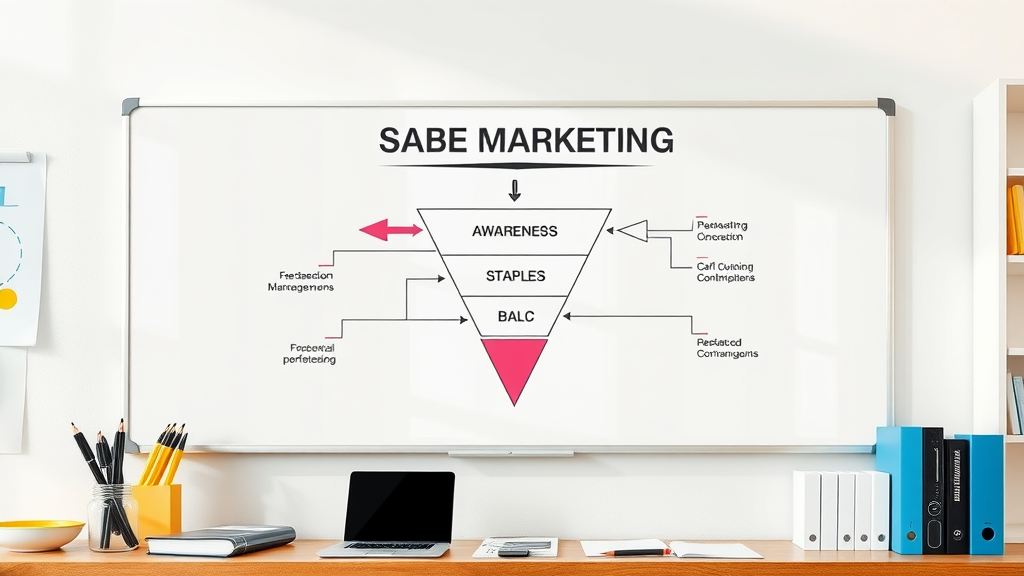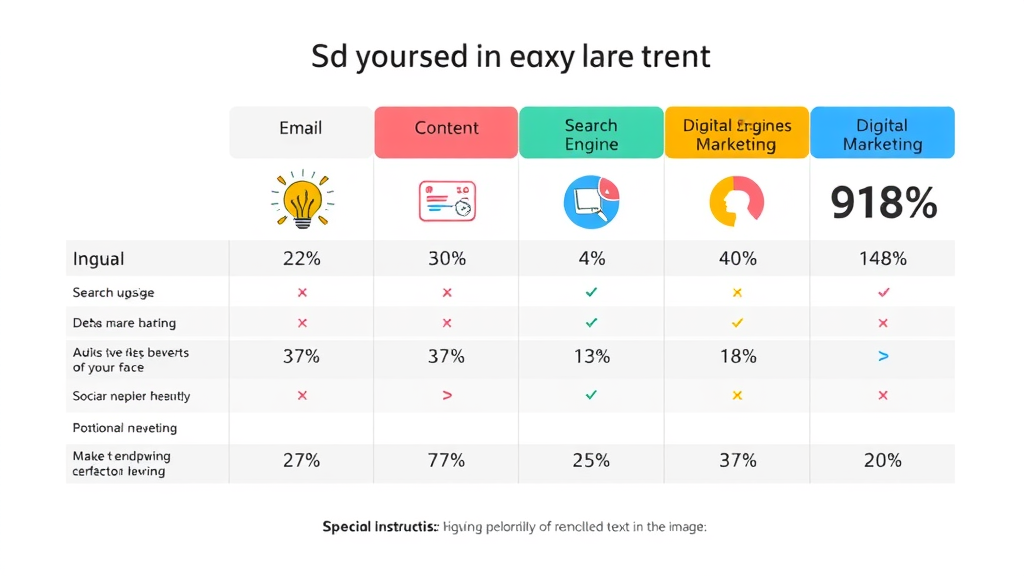Did you know that 60% of B2B marketers say ineffective strategies top the list of reasons for missed sales targets? If your B2B marketing strategies aren’t delivering, you’re not alone. The right approach can mean the difference between burning through your budget or driving real, sustainable growth. This comprehensive guide pulls back the curtain on high-impact marketing tactics, shares costly mistakes to sidestep, and provides the actionable steps you need to generate leads and outperform your competition. It’s time to reimagine your B2B marketing strategy — and avoid expensive errors along the way.

Discover Why Effective B2B Marketing Strategies Matter More Than Ever
- Did you know that 60% of B2B marketers report ineffective strategies as their top reason for missed sales targets? This article explores powerful B2B marketing strategies, reveals actionable steps, and uncovers the most common (and expensive) mistakes to avoid.
In today's ultra-competitive business landscape, effective B2B marketing strategies are crucial for driving sustainable growth. With longer buying cycles and increasingly informed buyers, companies must adapt quickly or risk falling behind. Not only does a robust marketing strategy connect you to the right target audience, but it also sets the stage for improved lead generation, more qualified sales opportunities, and better customer retention.
The stakes are especially high: organizations using outdated or mismatched strategies not only miss revenue goals but also waste valuable resources. Implementing a tailored marketing plan built around your buyers' unique pain points and business challenges can unleash lasting results. By addressing each stage of the marketing funnel , leveraging content marketing, and optimizing social media and digital marketing campaigns, you position your business as an industry leader while sidestepping common pitfalls. Now is the time to ensure your marketing efforts are aligned with business goals and capable of driving measurable results.
Key Lessons You’ll Take Away About B2B Marketing Strategies
- Critical components of leading B2B marketing strategies
- How to design a marketing plan that increases leads and sales
- Proven social media and content marketing tactics for B2B
- How to avoid common pitfalls in marketing strategy execution
- Actionable steps for optimizing each stage of the buyer journey
Throughout this guide, you’ll gain knowledge to overhaul your current approach. Learn why understanding your buyer journey is essential, how to choose the right marketing channels , and what makes social media marketing truly effective for B2B companies. We’ll explore how to identify and target the right audience, create memorable content, and implement automation tools that free up more time for scaling high-value activities. By the end, you’ll be equipped with the best B2B marketing strategies to avoid financial blunders and achieve long-term growth.
Defining B2B Marketing Strategies: Essential Concepts Explained

What is a B2B marketing strategy?
A B2B marketing strategy is an actionable plan designed to attract, engage, and convert other businesses into customers using targeted marketing efforts. Rather than appealing to individual consumers, these strategies focus on understanding the complex marketing funnel businesses traverse, addressing organization-wide pain points, and nurturing high-value leads through longer buying cycles. Ultimately, an effective strategy combines data-driven decision-making with tailored content and optimized marketing campaigns, boosting lead generation and driving revenue.
B2B vs. B2C Marketing Strategy: Core Differences
- Audience targeting and pain points: B2B strategies center on business needs and professional value, while B2C campaigns target personal benefits and emotional triggers.
- Buying process and marketing funnel: B2B buying cycles involve multiple decision-makers, require trust-building, and extend over weeks or months compared to quick B2C buying decisions.
- Channels: B2B marketing relies on LinkedIn, email marketing automation, industry forums, and search engine content. B2C leans on mass social media, influencer marketing, and broad digital campaigns.
The distinction impacts everything from your marketing plan to how you communicate, prioritize, and measure results. Knowing these differences empowers better decision-making in both strategy design and campaign execution.
Core Components of High-Impact B2B Marketing Strategies
Identifying the Target Audience and Buyer Journey

- How to research your B2B target audience
- Mapping pain points at each stage of the buyer journey
One of the pillars of effective B2B marketing strategies is a deep understanding of your target audience and the stages they experience throughout the buyer journey . Start by building comprehensive buyer personas using industry research, CRM data, and sales team feedback. Delve into your prospects’ industry challenges, preferred communication channels, and what drives their purchasing decisions.
Next, chart the buyer journey from initial awareness to post-purchase advocacy. At each stage, document pain points, common objections, and the information buyers seek to make confident decisions. This in-depth analysis allows you to deliver highly relevant content marketing, address concerns proactively, and move potential buyers smoothly through your marketing funnel . The more detailed your audience profiles and journey maps, the more tailored and successful your marketing campaigns will be.
Developing a Comprehensive B2B Marketing Plan
- Aligning your marketing plan with strategic business goals
- Selecting the right marketing channels
Every winning marketing strategy begins with a data-backed marketing plan tied directly to your organization’s top-level objectives. To make your plan actionable, set measurable campaign KPIs for lead gen, sales conversions, and brand awareness. Then, select marketing channels based on where your potential buyers spend the most time—whether that’s LinkedIn, targeted email campaigns, or search engine advertising.
Consider the unique strengths of each marketing channel in your mix. Email marketing excels at nurturing leads, while social media marketing is ideal for boosting brand credibility. Search engine tactics can maximize visibility for buyers actively searching for your products and services . Craft unified messaging and ensure a consistent cadence of outreach, positioning your company as a valuable industry resource across all platforms.
Proven B2B Marketing Strategies for Lead Generation and Growth
Content Marketing: Positioning Your Brand as an Industry Authority
- Blog posts, whitepapers, and case studies
- Thought leadership and SEO via search engine optimization

Content marketing remains a powerhouse in building trust with your B2B target audience. Produce a strategic mix of blog posts, whitepapers, case studies, and thought leadership articles to address buyer pain points at each stage of the funnel. These resources should provide deep insights, practical solutions, and proof of your company’s expertise.
Beyond educational blog posts, use content marketing to boost your search engine visibility through SEO best practices—targeting high-intent keywords and answering the questions your potential customers are asking. Case studies are especially valuable, giving potential buyers direct proof of the impact your products and services deliver. By consistently publishing high-value materials, you’ll establish your brand as an industry authority, generating more qualified leads and building lasting relationships.
Social Media Marketing for B2B: Best Channels and Techniques
- LinkedIn, Twitter, and niche digital marketing platforms
- Tips for building credibility and trust on social media

Social media marketing is no longer just for B2C—platforms like LinkedIn and Twitter offer game-changing opportunities for B2B brands. Build your presence by sharing thought leadership, engaging in industry conversations, and showcasing company wins. Use LinkedIn to connect with key decision-makers, join niche groups, and participate in relevant threads to build trust over time.
The key is to avoid being overly promotional and instead focus on adding value—whether by sharing original research, facilitating peer dialogue, or amplifying compelling case studies. Consistent social media campaigns help humanize your brand and keep your company top-of-mind among potential buyers and industry peers alike.
Email Marketing Automation for Scalable Lead Gen
- Crafting personalized campaigns
- Nurturing prospects through the marketing funnel

Email marketing automation puts scalable lead nurturing on autopilot for busy marketing teams. Use segmentation to craft personalized campaigns for each stage of the buyer journey, delivering content that directly addresses pain points and advances prospects closer to a purchase.
Automate timely follow-ups triggered by prospect actions (such as downloading a whitepaper or attending a webinar) to ensure no potential buyer slips through the cracks. Analyze open rates, click-throughs, and conversions to refine your messaging and maximize campaign effectiveness, all while freeing your sales team to focus on high-value conversations and closing deals.
Integrating Search Engine Tactics for Enhanced Visibility
- On-page SEO and content strategy
- Paid search and retargeting in a B2B marketing strategy

Leveraging search engine optimization (SEO) and paid search tactics broadens your reach to decision-makers actively seeking your products or services . Develop an on-page SEO content strategy built on high-value keywords, metadata optimization, and authoritative backlinks to enhance organic search engine rankings.
Supplement organic tactics with paid search campaigns targeting priority segments and retargeting ads to re-engage visitors who didn’t convert. By combining SEO and pay-per-click advertising, your B2B marketing strategies ensure maximum visibility across both search engines and digital marketing touchpoints, capturing high-intent leads at multiple points in their buyer journey.
Choosing the Right Marketing Channels For Your B2B Marketing Strategies
- Evaluating the ROI of each marketing channel
- Multi-channel and omnichannel marketing strategies
Not all marketing channels deliver equal value in the B2B space. Evaluate the ROI of each option—whether it’s content, email, social media, digital advertising, or search engine campaigns—using both quantitative and qualitative data. Factor in lead generation costs, conversion rates, and the match between the channel’s audience and your target buyer personas.
Today’s top-performing marketing plans blend multi-channel and omnichannel approaches. This means mapping out a seamless experience where buyers can interact with your brand across platforms without friction, reinforcing key messages at every stage. The result? Greater brand recall, higher engagement rates, and a better return on marketing investment.
Common Pain Points in B2B Marketing – And How to Overcome Them
- Identifying gaps in your marketing funnel
- Addressing content and digital marketing blind spots
- Overcoming challenges in lead generation and qualification

Many B2B companies struggle with pain points that stall marketing results and hurt ROI. Common obstacles include poor alignment between marketing and sales, a lack of clarity on target audience, and neglected stages in the marketing funnel , which can lead to lost leads and missed revenue.
Address these issues by conducting regular audits of your marketing operations. Identify gaps where potential buyers disengage or where content doesn’t match prospect pain points. Analyze digital marketing analytics to surface underperforming campaigns and blind spots in your lead gen process. Then, implement data-driven fixes, from adjusting content strategy to revamping outreach techniques, to ensure a smoother funnel and higher conversion rates.
Marketing Automation and Its Role in B2B Marketing Strategies
- Streamlining workflows
- Tracking, measuring, and optimizing every marketing effort
Marketing automation is the backbone of modern, scalable B2B marketing strategies . Automation streamlines manual workflows—such as follow-ups, scheduling newsletters, and segmenting contact lists—allowing you to focus on campaign creativity and analysis rather than repetitive tasks.
The real power lies in data collection and analytics. Marketing automation platforms provide a 360-degree view of the customer journey, enabling granular measurement of your marketing efforts . Track engagement, score leads in real time, and adjust campaigns based on actionable insights, optimizing for better cost efficiency and higher close rates.
Case Studies: Real-World Results With B2B Marketing Strategies
- Successful social media marketing in B2B
- Using content marketing to solve industry pain points
Real-life case studies show the power of effective B2B marketing. In one example, a SaaS company revamped its social media marketing approach, focusing exclusively on LinkedIn and integrating thought leadership blog posts that addressed target audience pain points. The campaign produced a 40% increase in inbound leads within four months, with higher quality prospects moving smoothly through the funnel.
Another success story comes from a manufacturing firm that doubled down on content marketing, publishing in-depth whitepapers and SEO-optimized blog posts that addressed complex buyer questions. The result: an 80% uptick in organic search traffic and a sharp rise in product inquiries from high-value accounts. Both examples prove that targeted strategies, rooted in audience understanding, can yield dramatic real-world improvements in lead generation and sales outcomes.
Comparison of B2B Marketing Channels: Effectiveness, Cost, & Lead Gen Potential

| Marketing Channel | Effectiveness | Cost | Lead Gen Potential |
|---|---|---|---|
| Email Marketing | High (personalized, direct nurture) | Low to Moderate | Very High |
| Social Media Marketing | Moderate to High (depends on platform) | Moderate | High |
| Content Marketing | High (long-term authority & SEO) | Moderate | High |
| Search Engine (SEO & Paid) | High (targeted, buyer intent) | Moderate to High | Very High |
| Digital Marketing (Display Ads, Retargeting) | Moderate | Variable | Moderate to High |
- Email, social media, content, search engine, and digital marketing breakdown
"Great B2B marketing strategies are customer-focused and data-driven. The best plans always start with a deep understanding of the target audience's needs." – Leading B2B Marketing Expert
- Checklist: Steps to Audit Your Existing Marketing Strategy
- Review your defined target audience and buyer personas
- Assess each stage of your marketing funnel for gaps
- Evaluate which marketing channels deliver the best ROI
- Analyze campaign performance data and key metrics
- Update content, automation flows, and outreach as needed
Frequently Asked Questions About B2B Marketing Strategies
What are the 4 types of B2B marketing?
The four types of B2B marketing typically are product-based, service-based, solution-based, and partnership-based marketing strategies, each serving distinct buyer needs.
What are the best B2B sales strategies?
The best B2B sales strategies combine targeted lead generation, tailored content marketing, effective sales funnels, and strategic follow-up for optimal conversion.
What is a B2C marketing strategy?
A B2C marketing strategy focuses on individual consumers, using emotional triggers and broad-based tactics, while B2B strategies are built for longer, relationship-driven sales cycles.
Video: The Importance of B2B Marketing Strategies in Today's Competitive Landscape
Video: Case Studies on Successful B2B Marketing Strategies Implementation
Expert Insights: Actionable Tips for Building Your Marketing Strategies
- Focus on the customer’s pain points
- Invest in continual learning and adapt to digital marketing trends
- Measure and optimize all marketing efforts
Experts agree: keeping your finger on the pulse of shifting industry trends and customer needs is paramount. Build your strategy around meaningful engagement, test different approaches, and always be willing to pivot when analytics point toward new opportunities or changing buyer behaviors.
People Also Ask: What is a B2B marketing strategy?
A B2B marketing strategy outlines a comprehensive plan to reach and influence business buyers, guiding the creation and distribution of content and communications tailored to the needs of professional audiences.
People Also Ask: What are the 4 types of B2B marketing?
The four types of B2B marketing include product-based, service-based, solution-based, and partnership-based approaches, each targeting differing organizational requirements and decision-making processes.
People Also Ask: What are the best B2B sales strategies?
Effective B2B sales strategies involve account-based marketing, nurturing high-value leads, personalized outreach, and leveraging data analytics to refine sales funnels.
People Also Ask: What is a B2C marketing strategy?
B2C marketing strategies are tailored to reach and convert individual consumers, often emphasizing broad digital marketing outreach and fast decision cycles compared to B2B.
Next Steps for Building Profitable B2B Marketing Strategies
- Assess your current marketing plan
- Apply the proven B2B marketing strategies listed here
- Continuously monitor and refine based on analytics and feedback
- Download our advanced B2B marketing checklist to optimize your efforts
Ready to transform your B2B marketing? Audit your existing approach, implement these high-impact strategies, and make data-driven optimizations for continuous growth. Start today!
 Add Row
Add Row  Add
Add 




Write A Comment